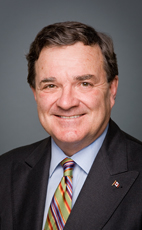Mr. Speaker, the only income splitting that we have proposed is income splitting for pensioners in Canada and I thank the Bloc Québécois for supporting our motion.
 House of Commons photo
House of Commons photoWon his last election, in 2011, with 58% of the vote.
Taxation November 22nd, 2006
Mr. Speaker, the only income splitting that we have proposed is income splitting for pensioners in Canada and I thank the Bloc Québécois for supporting our motion.
Transfer Payments November 22nd, 2006
Mr. Speaker, I do not know how the party opposite can take credit for funding increases this year, next year and years up to 2011 since it is not the government.
Having said that, the party opposite reduced transfers to the provinces in the 1990s on the backs of health care for Canadians. The suffering of Canadians in health care is wholly attributable to the government of the day. That is how it purported to balance budgets in Canada: on the backs of health care for Canadians.
Transfer Payments November 22nd, 2006
In fact, Mr. Speaker, the transfers to the provinces are $40 billion this year, increasing to $49 billion in 2011.
With respect to fiscal balance and the fiscal balance issue, yesterday we had this statement: “I recognize this is the first national government to acknowledge the fiscal imbalance and I am very pleased by that. This is a good first step.” That is from Dr. Marie Bountrogianni, the Minister of Intergovernmental Affairs for the province of Ontario, before the Senate committee yesterday.
Ways and Means November 21st, 2006
moved that a ways and means motion to introduce an Act to amend the Income Tax Act, including amendments in relation to foreign investment entities and non-resident trusts, and to provide for the bijural expression of the provisions of that Act, be concurred in.
(Motion agreed to)
Taxation November 21st, 2006
Mr. Speaker, I assure all members that the fall fiscal update is not a mini-budget. It is an update of the fiscal situation of the Government of Canada. At the same time, an economic plan will be released that will provide some direction about matters of principle and what we intend to do in terms of taxation.
As the member opposite knows, on October 31, for the first time in Canadian history, income splitting of pensions was announced, effective January 1, 2007, which will make a great difference to pensioners of all ages in Canada.
Income Trusts November 21st, 2006
Mr. Speaker, what happened this year and what we saw was a rapid acceleration of the quantity of conversions to income trusts. We also saw an acceleration of the quality of income trusts; that is more and more active Canadian corporations, including the two largest corporations in the telecommunications field, decided to go in that direction. This was a major change in Canada this year.
Pensions November 9th, 2006
Mr. Speaker, as the member opposite knows, the rules have been set out with respect to income splitting for pensioners and the rules will apply to everyone as they were set out when we announced it on October 31. With respect to extending beyond that, as I have indicated previously to the hon. member, that is something that we can review among many other taxation issues going forward.
Income Trusts November 9th, 2006
Mr. Speaker, the member opposite expresses concern about the little people, the small people, in Canada. It is in the interest of individual taxpayers and their families and it is in the interest of tax fairness that corporations, especially large corporations, in Canada pay their fair share of taxes. That was endangered by the growth of income trusts.
Federal-Provincial Relations November 9th, 2006
Mr. Speaker, no province is doing better than the province of Ontario. There is an agreement of not just five years, which the Liberal government entered into, but a full year more, six years, with $6.9 billion from the federal government to the Government of Ontario.
This is a great agreement for the province of Ontario.
Federal-Provincial Relations November 9th, 2006
Mr. Speaker, as I explained to the member opposite at the committee, there are aspects of the agreement that are solely expenses that are going to be paid to the revenues that are going to be paid to the province of Ontario. For example, there are $300 million for infrastructure that only the province of Ontario will receive as a result of the Canada-Ontario agreement.